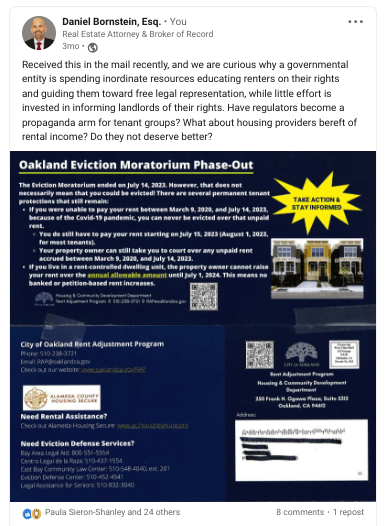Oakland is at it again, explores a new set of tenant protections

Not long after the ink dried on a new law that added additional guardrails for Oakland tenants that we covered in an earlier webinar, there were calls for even greater protections in a November 14 meeting convened by the City’s Community Economic Development Committee (CED).
It was stressed early on in the public forum that while elected state and local representatives enact the law, RAP and housing regulators may have to fine-tune their policies to comport with those laws.
It seems reasonable enough - the administrative bodies tasked with implementing the rules need to make adjustments.
This is not what we witnessed in the CED gathering. Instead, we saw big, bold initiatives put forward by RAP.
In an earlier post that struck a nerve, we questioned whether an impartial, taxpayer-funded rent board should become a propaganda arm of tenants’ advocates. This was after we received a beautiful, high-gloss postcard in the mail educating tenants on their rights. We are unaware of any similar concerted efforts to inform landlords of their recourse when encountering problematic tenants.
Let's review some of the proposals floated, in summary fashion.
Remove The Requirement That A Tenant Be Current On Rent In Order To File Or Respond To A Petition With The Rent Adjustment Program
This is a blatant double standard. Rental property owners must be current on their RAP fees and must register their rental units to have the "privilege" of filing petitions and responding to tenants' petitions.
Increase Restitution Period For Decreased Housing Service Petitions
As it stands now, tenants can file a petition claiming a decrease in housing services, but the restitution period is limited to 90 days. The Rent Board is now proposing that this restitution period be extended to 3 years, reasoning that when a tenant's petition for an improper rent increase is granted, the restitution period is 3 years.
The agenda is to treat a decrease in housing services the same as an improper rent increase; under the current regulatory regime, the tenant can get money for the past 3 months of lost services but under the new proposal, they will be able to get money for 36 months of lost services.
Conceivably, the tenant can remain quiet and withhold any grievance about a decrease in housing services, wait for three years to file a petition and get a windfall rebate in rent. To be made whole, tenants must show that the "owner knew or should have known about the decreased housing service."
Yet proposed changes do not have any notification requirements to alert the landlord to a decrease in services. Moreover, the Board's recommendations do not mention how much time an owner would have to cure any alleged reduction in housing services.
Amending its ordinance to be more aligned with the statewide Ellis Act law when owners want to go out of the rental business
When, exactly, is a property considered withdrawn from the rental market? This is up for debate. If the Board's recommendations come to pass, it will make it more difficult to Ellis a building, meaning that those owners stuck with an underperforming building will be stuck longer. They can't go out of business anytime soon.
Unfortunately, our office has seen an uptick in the number of owners who want to give up because they have been starved of rental income due to eviction moratoriums, or because they are simply fed up with an ever-increasing regulatory regime. Many are investing in housing opportunities in Texas, Nevada, and other places more friendly to landlords and we can't fault them.
In ordinary times, Ellis Act evictions are an enormously complex, costly, and lengthy process but you can expect that this will be dragged on further.
Remove The Appearance Requirement For Appellant
If someone appeals a serious decision made by the Rent Board, it impacts their lives in some way. Shouldn't the impacted parties show up to make their case? Under a new proposal, they need not attend a hearing and can present a "good cause" to be absent. What exactly is a good excuse to skip out is yet to be defined. We believe that a tenant's absenteeism will be more forgivable than a landlord's.
These are some of the most concerning items that were put on the agenda, but there are more. For those with the time and inclination, the CED meeting can be watched in its entirety here:
Have housing providers and their advocates been brought to the table and alerted of sweeping new changes underway?
On this question, representatives from the Rent Board fumbled a little bit, making vague references to a couple of meetings and an email blast campaign, but admitted that many landlords remain in the dark. Everyone seemed broadsided by this clandestine agenda, including us.
As the chief architect of the Moms4Housing movement, Councilmember Carroll Fife is an unlikely bedfellow for landlords, but she did express concern about transparency, noting that housing providers will be resistant to these measures once they know about them.

Parting thoughts
Many housing providers deprived of rental income were in a celebratory mood as COVID-era eviction moratoriums expired, only to find out that there are additional tenant protections unrelated to a pandemic-related hardship.
The fear of tenant displacement during a public health crisis has spawned a whole new set of tenant protections being floated, and we would expect nothing less.Yet this agenda should be out in the open and shared with our community and industry partners such as the East Bay Rental Housing Association, which says they have been largely left in the dark.
In a time when landlords have a target on their backs and the political rhetoric falls squarely on the side of renters, Bornstein Law advocates for the rights of owners and can help navigate the minefields inherent to owning or managing a rental business.


